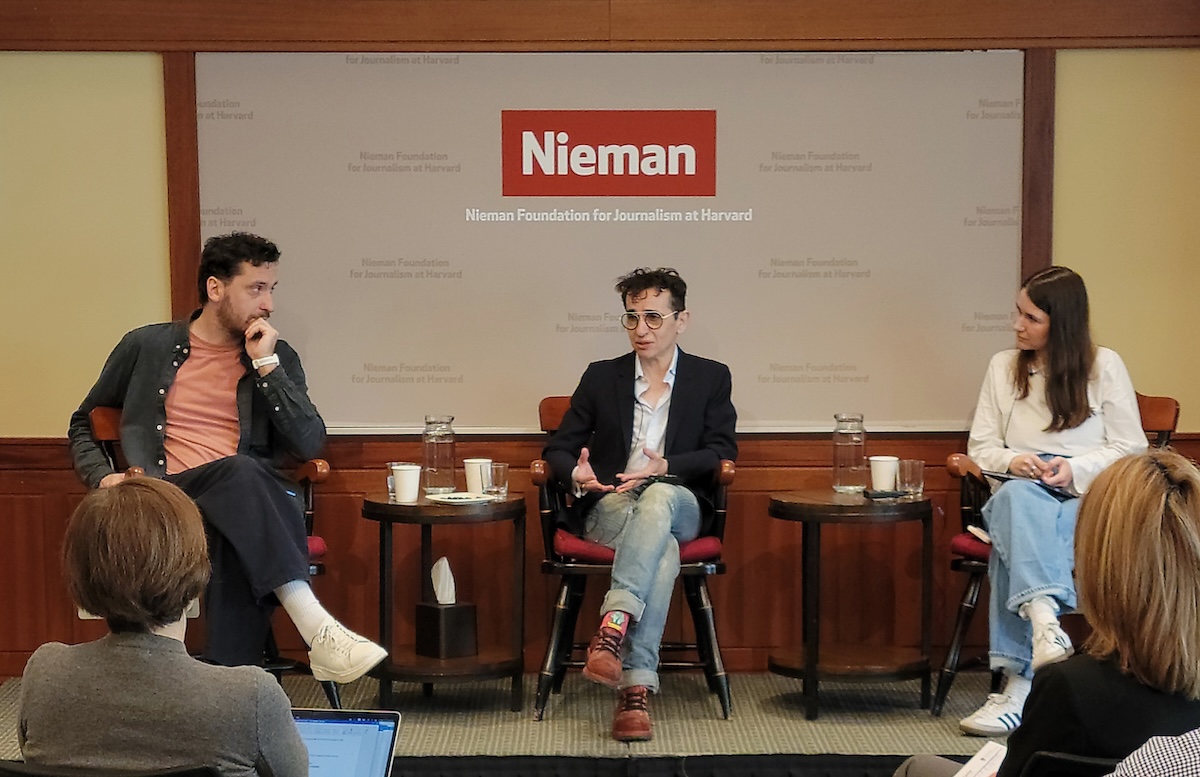Since the start of Russia’s full-scale invasion of Ukraine, Russian independent media outlets have faced intense censorship by the government. In March 2022, a few days after the war began, the government swiftly implemented a series of laws curtailing criticism of the Russian armed forces; questioning Moscow’s “special military operation” in Ukraine is now a criminal offense.
Independent media outlets such as Meduza, iStories, The Moscow Times, Novaya Gazeta, and TV Rain were forced to shut down. Arrest warrants have been issued for some reporters, media offices have been raided by police, and hundreds of Russian journalists have fled the country to escape persecution.
Many of these reporters and editors now work in exile. But as they continue to file stories that challenge Kremlin-backed propaganda, Russia’s censors are attempting to control the narrative within the country. In the last two years, the government has forced publishers to delete all mention of political opposition, dissent over the war in Ukraine, and LGBTQ+ issues — not just in stories being produced now but retroactively.
This wave of censorship and crackdown on independent news sources inspired veteran journalist, author, and New York Times opinion columnist Masha Gessen, a 2004 Nieman Fellow, to create an archive to preserve the work of Russian independent media for current and future generations. Gessen co-founded and launched the Russian Independent Media Archive (RIMA) in May 2023, which currently holds the published reports of 55 media outlets since 2000, the year President Vladimir Putin took office.
Gessen has since been convicted in absentia in Russia and sentenced to eight years in prison for their remarks on the Russian military’s alleged atrocities in Bucha, Ukraine.
Gessen and co-founder Ilia Venyavkin spoke to Nieman Fellows about the challenges of creating the RIMA, the funding for the project, the role of independent archives in countering propaganda, and the importance of Russian journalists working in exile. Edited excerpts:
On the genesis of the RIMA:
Masha Gessen: During the start of the full-scale invasion, I was in Moscow at TV Rain, the independent television channel, on the last night when it was broadcasting. People fled the building, thinking that it was about to get raided. And I was thinking, as people were sort of tumbling down the stairs, “I wonder what kind of shape their archives are in.”
The fear didn’t actually end up happening that night — that the police were going to come in, smash everything to bits, chase people out of the building, and maybe arrest somebody. But I knew that not a whole lot of what TV Rain had done was actually safely uploaded to the cloud, and I was wondering what was going to happen to all [their] hardware.
A few weeks later, when I flew back to the States, I was talking to a philanthropist named Peter Barbey because I happened to be seated next to him. I said, “We need to create something to safeguard the archives of all these media outlets that have fled Russia.” We think that the internet is forever, but it’s only forever if you keep it up, and if you pay for it. A lot of these outlets are going to close, and even if they don’t close, their first priority is not necessarily to keep up their archives. So Peter Barbey said, “Okay, I’ll fund this.”
Within a few months, we had this project started. It was a joint project of Bard College and PEN America. Serob [Khachatryan], who runs the technical stuff, came to the States and started building it.
It’s something that we didn’t consider when we started, but we actually have a great interest in [also] preserving non-independent media, because they’re the ones who are going back and really altering their archives.
On the archive’s objectives and challenges:
Ilia Venyavkin: We were inspired by the development of data science and the new approaches of extracting information from data.
We saw that our task is not only to store everything we can, but to transform it into a unified format, so that you can mine the data and extract different insights, such as working with semantic analysis to see the frequency of different words, of being able to trace connections with different people, and so on. We found out that this task is much more difficult than we expected, since the formats and standards of working [have] changed so much. To unify a newspaper that was published in [the] 1990s and a Telegram channel that is [publishing] right now – which is the only way to avoid censorship – if you want to unify that, you need to just make a lot of sophisticated decisions. We enjoy working on that, but it’s still a rather complicated task.
On how archival work can counterstate propaganda:
Venyavkin: We know – especially when we’re dealing with dictatorships – that archives can be very important, because the state is very sophisticated in hiding the traces of crimes and the destinies of different people. Giving people access to personal stories and narratives creates, as we believe, a certain pushback [against] the dictatorship.
Right now, what is happening is the hidden destruction of the archives of LGBTQ+ people. All the media in Russia know that they need to delete the stories and interviews of individuals belonging to this community.
To my surprise, I got an email from a researcher asking for advice. He was working on the history of the LGBTQ+ movement in Russia and wanted to get an issue of the magazine called Sobaka. In 2006, there was an issue dedicated to the history of LGBTQ+ people in Russia, and it was called “The End of Homosexualism.” The idea behind that was homosexualism as a notion was disappearing, and then in a few years, there’ll be no sense of labeling, because these people will be considered normal and accepted.
But if you go to the archive of Sobaka online, you will find that there are only 11 issues, because this issue [appears to have] never existed. We were thankful that this issue was saved on the Internet Archive. But the problem was that they put so much effort into preservation and didn’t have time and resources to make sure it was easily available through search. So sometimes our task is to pick out these issues and republish them on our website, so they can be easily accessible.
Gessen: The last time we had a change of regime, or we thought we had a change of regime in Russia, in 1991, people started to try to learn history, and it was extremely difficult. There was the Soviet joke in the Soviet Union: “Not only the future is unpredictable, but so is the past.” There was a concerted effort in the Soviet Union to obscure information in real time and to hide the past. We [at RIMA] didn’t want to end up in the position of people – or to see our children or grandchildren end up in the position of people – who need to reconstruct history basically from scratch, which is almost impossible.
Russia has passed a series of laws recently, one that basically makes it illegal to portray LGBT people in any positive or neutral way. The thing about Russian laws, as with many tyrannical countries, is that they work retroactively. It doesn’t matter that something was published years before the law went into effect. So that’s why the magazine Sobaka has made its issue disappear online.
There is indeed this amazing resource called the Internet Archive on the Wayback Machine. But they have a policy that if somebody goes to them and says, “Please remove this from your archives,” they will remove it. It’s an apolitical position. For them, it’s a copyright-protection thing. Basically, they’re trying to avoid getting sued for copyright violations. Right now, I’m working with a graduate student who’s looking at the change in language and framing in Russian independent media in covering LGBT issues. And I was thinking, what if things had disappeared? What if they were working on this 10 years from now, and trying to figure out how people wrote about LGBT issues while these repressive laws were being passed, and nobody safeguarded these media outlets?
On the importance of Russian journalists in exile and independent media outlets continuing their work abroad:
Gessen: In earlier generations, generally speaking, when journalists were forced to leave their country, they were also forced to leave the profession. Now we actually see in the case of Russia, but also in the case of many other countries, entire populations and generations of journalists go out of their country and reinvent journalism in exile.
An example is the coverage of the funeral of Alexei Navalny. The Kremlin did everything possible to ensure that nobody could cover it. So we knew this was very dangerous and no journalist could go near it. But of course, there were tens of thousands of people there. They had cellphones and they were uploading stuff to Telegram channels. Russian journalists in exile were crawling these Telegram channels and also soliciting footage to their Telegram tip lines. They were able to put together what we think was a pretty full picture of this extraordinary event of civic life. This is the sort of thing that only Russian journalists working in exile could have done. Nobody else is in a position to solicit that footage, find that footage, and have the expertise, including the geographic, the physical expertise, the familiarity with space, to be able to put it together.
Venyavkin: I believe that if we think about the possibility of another nation in Russia, you need to have a “nucleus” in a certain sense. I believe that this network of independent media, they are servicing this kind of alternative as a civil nation. So it’s not powerful enough, it doesn’t have its state, or order and government, but we know that it exists, and this community has a couple of million [people reading independent Russian media].
If you imagine that all of this media stopped working, this community of people will lose connection and will lose hope. I believe that at the end of the day — I know that from the business perspective it’s not so bright — but from this humanistic point of view, there’s still a way to maintain this possibility of another civil nation existence just for people who speak Russian. We know that there’s lots of people in Russia who read [these media outlets], and we are doing a service for them.



